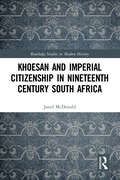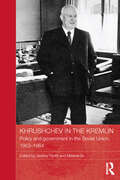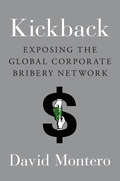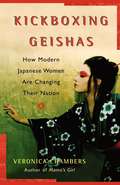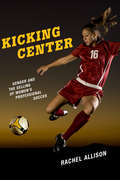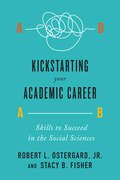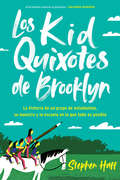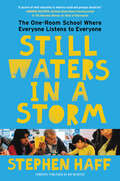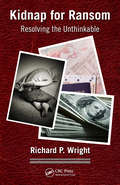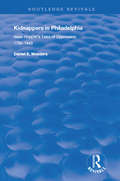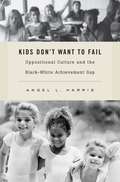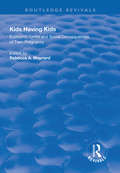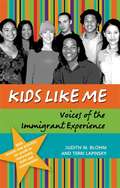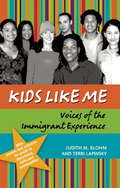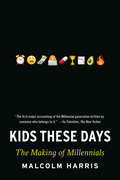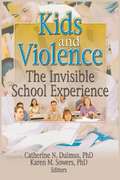- Table View
- List View
Khoesan and Imperial Citizenship in Nineteenth Century South Africa (Routledge Studies in Modern History)
by Jared McDonaldThis volume explores the formative and expressive dynamics of Khoesan identity during a crucial period of incorporation as an underclass into Cape colonial society.Khoesan and Imperial Citizenship in Nineteenth Century South Africa emphasises loyalism and subjecthood – posited as imperial citizenship – as foundational aspects of Khoesan resistance to the debilitating effects of settler colonialism. The work argues that Khoesan were active in the creation of their identity as imperial citizens and that expressions of loyalty to the British Crown were reflective of a political and civic consciousness that transcended their racially defined place in Cape colonial society. Following a chronological trajectory from the mid-1790s to the late 1850s, author Jared McDonald examines the combined influences of colonial law, evangelical-humanitarianism, imperial commissions of inquiry, and the abolition of slavery as conduits for the notion of imperial citizenship. As histories and legacies of colonialism come under increasing scrutiny, the history of the Khoesan during this period highlights the complex nature of power and its imposition, and the myriad, nuanced ways in which the oppressed react, resist, and engage.This book will be of interest to scholars and students working on British imperialism in Africa, as well as histories of settler colonialism, nationalism, and loyalism.
Khrushchev in the Kremlin: Policy and Government in the Soviet Union, 1953–64 (BASEES/Routledge Series on Russian and East European Studies)
by Jeremy SmithThis book presents a new picture of the politics, economics and process of government in the Soviet Union under the leadership of Nikita Khrushchev. Based in large part on original research in recently declassified archive collections, the book examines the full complexity of government, including formal and informal political relationships; economic reforms and nationality relations in the national republics of the USSR; the treatment of political dissent; economic progress through technological innovation; relations with the Eastern bloc; corruption and deceit in the economy; and the reform of the railways and construction sectors. The book re-evaluates the Khrushchev era as one which represented a significant departure from the Stalin years, introducing a number of policy changes that only came to fruition later, whilst still suffering from many of the limitations imposed by the Stalinist system. Unlike many other studies which consider the subject from the perspective of the Cold War and superpower relations, this book provides an overview of the internal development of the Soviet Union in this period, locating it in the broader context of Soviet history. This is the companion volume to the Jeremy Smith and Melanie Ilic’s previous edited collection, Soviet State and Society under Nikita Khrushchev (Routledge, 2009).
Kick The Dead Lion: A Case Book Of The Custer Battle
by Charles G. Du BoisVol. One in ECHOES OF THE LITTLE BIG HORN SERIES, KICK THE DEAD LION by Charles G. du Bois, is a Custer classic, it focuses on the performance of Custer, Benteen and Reno; Enlisted Men's Petition analysed."On June 25, 1876, the greatest Indian battle in the history of the American West was fought on the Little Bighorn River in southeastern Montana. The combined forces of Sioux and Cheyennes encamped there defeated the Seventh U.S. Cavalry Regiment and annihilated five companies of the regiment under the personal leadership of Brevet Major General George Armstrong Custer.The firing had scarcely ceased, the Indians had only scattered, and the soldier dead still lay hastily buried on a lonely Montana ridge when it began--the unending, ever-increasing slander and defamation against General Custer. His brilliant record established during the Civil War, his victories on the western plains in the years that followed were ignored. The nation's hero was slowly toppled from his pedestal.The Lion was dead.Like jackals snapping at the heels of the lord of the jungle, the defamers began their work. It was no simple task, but they applied themselves with vigor. So thorough was the campaign that only those close to the fallen Custer rallied to his defense. Now they are gone, friend and foe alike, but the perpetrators of the campaign of hate have bequeathed to history a legacy of distorted fact and perverted truth."-Introduction.
Kickback: Exposing the Global Corporate Bribery Network
by David MonteroAn investigation into corporate bribery around the world and how it undermines democracy and the free market systemThe World Bank estimates that rich multinational corporations pay hundreds of billions of dollars in bribes every year to officials overseas. The perpetrators are not a handful of rogue companies, but many members of the Fortune 500. Kickback is a sweeping, global investigation into corporate bribery around the world and how backdoor financial transactions undermine democracy and the free market system by lining the pockets of some of the world's worst dictators and criminals. Ultimately, this system affects billions of people by creating conditions that lead to poverty, violence, environmental disaster, and political instability in countries like Nigeria, Bahrain, Costa Rica, and Iraq.Kickback traces the origins of corporate bribery from the reign of the British East India Company to the methods by which it is carried out today. Traveling across four continents and interviewing police and intelligence officials, convicted criminals, business executives, and corruption experts, David Montero takes an inside look at bribery's pernicious effects. He examines its ramifications at both the individual and national levels--from the murder of a young activist in Bangladesh to a Texas billionaire's dealings with Saddam Hussein, from pharmaceutical firms' payoffs in China to how the entrenched culture of bribery helped destroy the Greek economy. Montero also examines the countermeasures that have been introduced to combat these practices, such as the Justice Department's efforts to halt them and attempts to identify and provide restitution to victims.Given the new era of profound uncertainty we are entering--the strength of the European Union founders, the power of China rises, the global economy continues on a path of perilous flux, and allegations mount that President Donald Trump and his associates are possibly tainted by bribery themselves--the stakes for eradicating corporate bribery have never been higher.
Kickboxing Geishas
by Veronica ChambersForget the stereotypes. Today's Japanese women are shattering them -- breaking the bonds of tradition and dramatically transforming their culture. Shopping-crazed schoolgirls in Hello Kitty costumes and the Harajuku girls Gwen Stefani helped make so popular have grabbed the media's attention. But as critically acclaimed author Veronica Chambers has discovered through years of returning to Japan and interviewing Japanese women, the more interesting story is that of the legions of everyday women -- from the office suites to radio and TV studios to the worlds of art and fashion and on to the halls of government -- who have kicked off a revolution in their country. Japanese men hardly know what has hit them. In a single generation, women in Japan have rewritten the rules in both the bedroom and the boardroom. Not a day goes by in Japan that a powerful woman doesn't make the front page of the newspapers. In the face of still-fierce sexism, a new breed of women is breaking through the "rice paper ceiling" of Japan's salary-man dominated corporate culture. The women are traveling the world -- while the men stay at home -- and returning with a cosmopolitan sophistication that is injecting an edgy, stylish internationalism into Japanese life. So many women are happily delaying marriage into their thirties -- labeled "losing dogs" and yet loving their liberated lives -- that the country's birth rate is in crisis. With her keen eye for all facets of Japanese life, Veronica Chambers travels through the exciting world of Japan's new modern women to introduce these "kickboxing geishas" and the stories of their lives: the wildly popular young hip-hop DJ; the TV chef who is also a government minister; the entrepreneur who founded a market research firm specializing in charting the tastes of the teenage girls driving the country's GNC -- "gross national cool"; and the Osaka assembly-woman who came out publicly as a lesbian -- the first openly gay politician in the country. Taking readers deep into these women's lives and giving the lie to the condescending stereotypes, Chambers reveals the vibrant, dynamic, and fascinating true story of the Japanese women we've never met. Kickboxing Geishas is an entrancing journey into the exciting, bold, stylish new Japan these women are making.
Kicking Center: Gender and the Selling of Women's Professional Soccer (Critical Issues in Sport and Society)
by Rachel AllisonGirls and young women participate in soccer at record levels and the Women’s National Team regularly draws media, corporate, and popular attention. Yet despite increased representation and visibility, gender disparities in opportunity, compensation, training resources, and media airtime persist in soccer, and two professional leagues for women have failed since 2000. In Kicking Center, Rachel Allison investigates a women’s soccer league seeking to break into the male-dominated center of U.S. professional sport. Through an examination of the challenges and opportunities identified by those working for and with this league, she demonstrates how gender inequality is both constructed and contested in professional sport. Allison details the complex constructions of race, class, gender, and sexuality in the selling and marketing of women’s soccer in a half-changed sports landscape characterized by both progress and backlash, and where professional sports are still understood to be men’s territory.
Kicks: The Great American Story of Sneakers
by Nicholas SmithA cultural history of sneakers, tracing the footprint of one of our most iconic fashions across sports, business, pop culture, and American identityWhen the athletic shoe graduated from the beaches and croquet courts of the wealthy elite to streetwear ubiquity, its journey through the heart of American life was just getting started. In this rollicking narrative, Nicholas K. Smith carries us through the long twentieth century as sneakers became the totem of subcultures from California skateboarders to New York rappers, the cause of gang violence and riots, the heart of a global economic controversy, the lynchpin in a quest to turn big sports into big business, and the muse of high fashion. Studded with larger-than-life mavericks and unexpected visionaries—from genius rubber inventor, Charles Goodyear, to road-warrior huckster Chuck Taylor, to the feuding brothers who founded Adidas and Puma, to the track coach who changed the sport by pouring rubber in his wife's waffle iron—Kicks introduces us to the sneaker's surprisingly influential, enduring, and evolving legacy.
Kickstarting Your Academic Career: Skills To Succeed In The Social Sciences
by Robert L. Ostergard Jr. Stacy B. FisherKickstarting Your Academic Career is a primer on the common scholastic demands that social sciences students face upon entering college or university. Based on the challenges that instructors most often find students need help with, the authors offer practical advice and tips on topics such as how to communicate with instructors, take notes, read a textbook, research and write papers, and write successful exams. The succinct writing and clear organization make this an essential reference for first-year students as they encounter post-secondary work for the first time, and a useful refresher for upper-year students looking to refine their skills.
Kid Quixotes \ Los Kid Quixotes de Brooklyn (Spanish edition): La historia de un grupo de estudiantes, su maestro y la escuela en la que todo es posible
by Stephen Haff«Cervantes estaría orgulloso de que su novela de hace 400 años esté ayudando a estos extraordinarios chicos y su maestro a comprender sus vidas». —SALMAN RUSHDIE«En todos mis años de escritora y profesora universitaria no he visto nunca nada igual». —VALERIA LUISELLI «Haff retrata lo que la educación en Estados Unidos podría, y quizá debería, ser». —ANDREW SOLOMON«Todo el mundo debería leer este libro». —CRISTINA HENRÍQUEZ Los Kid Quixotes de Brooklyn cuenta la historia de un pequeño local de Nueva York donde, todas las tardes, un maestro se reune con un grupo de chicos de entre cinco y quince años para leer y escribir en inglés y español, a salvo de las preocupaciones de las familias inmigrantes en una época de declarada hostilidad. Tras superar una crisis personal, Stephen Haff, creó este espacio dedicado a la empatía y la colaboración en el que todos, adultos y niños, cumplen con reverencia una única regla: escucharse los unos a los otros. Este sencillo acto de generosidad produce efectos asombrosos. En estas páginas descubrimos cómo Stephen y sus estudiantes trabajan en grupo para traducir Don Quijote del inglés y convertirlo en una obra musical que acabarán representando en ayuntamientos, embajadas y universidades. La atención reverencial que han aprendido a prestarse unos a otros los ha impulsado a superar todo tipo de dificultades y transmitir un mensaje de solidaridad y resistencia lleno de esperanza y optimismo. Stephen Haff es el fundador de Still Waters in a Storm. Fue maestro de Lengua y Literatura en Bushwick High durante más de diez años. Obtuvo una maestría en teatro en la Universidad de Yale y ha dirigido obras e impartido clases en Nueva York, Vermont y Canadá. Asimismo, ha escrito para The Village Voice, American Theater y otras publicaciones.
Kid Quixotes: A Group of Students, Their Teacher, and the One-Room School Where Everything Is Possible
by Stephen HaffLa inesperada e inspiradora historia real de un salón de clases donde los hijos de inmigrantes indocumentados y sus maestros encuentran su voz y enfrentan el clima político actual con su herramienta más poderosa: su verdad. Still Waters in a Storm («Agua calmada en medio de la tormenta») es un programa extracurricular fundado por Stephen Haff en el 2010 en Bushwick, Brooklyn. Haff, un antiguo maestro de escuela pública, se reúne con veinte estudiantes entre las edades de 5-17 seis veces a la semana para analizar los clásicos, como El paraíso perdido de John Milton, tocar el violín, escribir música y estudiar el latín. Para ellos es un refugio en medio de sus tormentosas vidas. Para los estudiantes, que viven con el miedo constante de ser deportados, Still Waters es una comunidad segura que estimula sus voces. Para Haff representa el santuario por el cual luchó para crear después de haber regresado a Brooklyn a enseñar tras una crisis causada por una depresión bipolar. Haff, quien se inspiró en sus propias experiencias teatrales y pedagógicas con la esperanza de proveerle a los niños una válvula de escape que no existía en el mundo de escuelas públicas que abandonó, desarrolló su nuevo método pedagógico basándose en las terapias de Alcohólicos Anónimos, los rezos de los cuáqueros, la sicoterapia, y hasta en las enseñanzas budistas para así crear un ambiente empático y colaborativo. En este liviano y acogedor espacio, Stephen y sus estudiantes encuentran consuelo y algo más: sus voces. Todos se pusieron de acuerdo: en Still Waters habría solo una regla, todos se escuchan los unos a los otros. Y esta regla ha desatado su increíble potencial. En el 2016, un estudiate de Still Waters aceptó un nuevo desafío: con la ayuda de varios diccionarios, y el visto bueno de la aclamada traductora cervantina, Edith Grossman, traducirían capítulos del clásico Don Quijote de la Mancha del inglés al español. Han tomado la esencia de la historia, aquella de un soñador que no se rinde, y lo transforman para poder contar la historia de sus padres inmigrantes. Para hablar sobre su comunidad, los niños han ido un paso más allá y han adaptado sus traducciones a un errante musical moderno, Las aventuras errantes del niño Quijote, la cual han presentado a lo largo del este de los Estados Unidos. La estrella de Los pequeños quijotes de Brooklyn es Sarah Sierra, de seis años. Antes de Still Waters, Sarah era callada, pero ahora que tiene tantas historias que contar, como la travesía de su madre a través del desierto hacia América en un tigre, o la historia de una niña-caballero que derrota a los gigantes de hielo que encierran a los niños. Sarah no es la única con una historia singular: Talia antes lloraba en la escuela porque no sabía leer, pero ahora sueña con ser una escritora y una adolescente llamada Alex conquista su miedo al público al cantar una canción sobre la aceptación de su sexualidad que recibió una gran ovación. Estos estudiantes han encontrado su voz en Still Waters, y la están utilizando para compartir un mensaje sobre la diversidad, la tolerancia, el amor, el optimismo, y la resiliencia que nos es indispensable a todos. Stephen Haff es el fundador de Still Waters in a Storm, un programa extracurricular dirigido hacia la comunidad h Con su contribuidora, Sarah Sierra: Sarah Sierra se unió a Still Waters in a Storm en 2015 a los seis años. Fue uno de los miembros fundadores del grupo musical Los pequeños quijotes de Brooklyn y obtuvo el papel principal en Las aventuras errantes del niño Quijote. Le encanta contar imaginativas historias que convencen al público de que todo es posible si lo intentas.
Kidnap for Ransom: Resolving the Unthinkable
by Richard P. WrightThe enormous sums paid for the release of hostages coupled with law enforcement‘s inability to stem the tide has made kidnapping for ransom a worldwide plague. The increasing rate of reported incidents from every corner of the globe suggests this plague is growing. Kidnap for Ransom: Resolving the Unthinkable removes the veil of mystery and dispels
Kidnappers in Philadelphia: Isaac Hopper's Tales of Oppression, 1780-1843 (Routledge Revivals)
by Daniel E. MeadersFirst published in 1994, Kidnappers in Philadelphia: Isaac Hopper's Tales of Oppression 1780-1843 collates Isaac Hoppers original tales. Complementing the original seventy-nine compiled narratives, this expanded edition features "The Life of Cooper" and seven newly discovered slave narratives published by Isaac Hopper in the National Anti-Slavery Standard between June and September 1840. The original index of planter's names and a new comprehensive general index will help readers locate valuable historical information.
Kidnapping and Abduction: Minimizing the Threat and Lessons in Survival
by Brian John HeardTerrorist groups and organized crime cartels pose an increasing threat of kidnapping throughout many regions in the word. At the same time, international travel has become more commonplace for both business and leisure purposes. Kidnapping and Abduction: Minimizing the Threat and Lessons in Survival provides a practical guide on the precautions tra
Kids Can Help Fight Poverty (Kids Can Help)
by Emily RaijMake the world a better place for people in need! This book is full of ideas and projects readers can put into action to fight poverty.
Kids Can Help Kids (Kids Can Help)
by Emily RaijMake the world a better place for kids! This book is full of ideas and projects readers can put into action to help with racial justice and human rights.
Kids Can Help the Environment (Kids Can Help)
by Emily RaijMake the world a cleaner, healthier place to live! This book is full of ideas and projects readers can put into action to help the environment.
Kids Discover World Geography Grade 6
by Houghton Mifflin HarcourtIf it's about Earth's land, water, air, or living things--particularly people--it's about geography. The word comes from the Greek geo, which means "earth," and graphy, which means "writing or description." Physical geographers study land-forms, water, soil, climate, and the distribution of living things. Human geographers explore the ways people interact with the environment. They may be city or environmental planners, transportation specialists, or market researchers.
Kids Don't Want to Fail: Oppositional Culture and the Black-White Achievement Gap
by Angel L. HarrisUnderstanding the causes of the racial achievement gap in American education—and then addressing it with effective programs—is one of the most urgent problems communities and educators face. For many years, the most popular explanation for the achievement gap has been the “oppositional culture theory”: the idea that black students underperform in secondary schools because of a group culture that devalues learning and sees academic effort as “acting white.” Despite lack of evidence for this belief, classroom teachers accept it, with predictable self-fulfilling results. In a careful quantitative assessment of the oppositional culture hypothesis, Angel L. Harris tested its empirical implications systematically and broadened his analysis to include data from British schools. From every conceivable angle of examination, the oppositional culture theory fell flat. Despite achieving less in school, black students value schooling more than their white counterparts do. Black kids perform badly in high school not because they don’t want to succeed but because they enter without the necessary skills. Harris finds that the achievement gap starts to open up in preadolescence—when cumulating socioeconomic and health disadvantages inhibit skills development and when students start to feel the impact of lowered teacher expectations. Kids Don’t Want to Fail is must reading for teachers, academics, policy makers, and anyone interested in understanding the intersection of race and education.
Kids Gone Wild: From Rainbow Parties to Sexting, Understanding the Hype Over Teen Sex
by Joel Best Kathleen A BogleThe myths and truths of teen's sexual behavior.Winner of the 2015 Brian McConnell Book Award presented by the International Society for Contemporary Legend ResearchTo hear mainstream media sources tell it, the sexlives of modern teenagers outpace even the smuttiest of cable television shows.Teen girls “sext” explicit photos to boys they like; they wear “sex bracelets”that signify what sexual activities they have done, or will do; they team upwith other girls at “rainbow parties” to perform sex acts on groups of willingteen boys; they form “pregnancy pacts” with their best girlfriends to allbecome teen mothers at the same time. From The Today Show, to CNN, to the New York Times, stories of these eventshave been featured widely in the media. But are most teenage—oryounger—children really going to sex parties and having multiple sexualencounters in an orgy-like fashion? Researcherssay no—teen sex is actually not rampant and teen pregnancy is at low levels.But why do stories like these find such media traffic, exploiting parents’worst fears? How do these rumors get started, and how do they travel around thecountry and even across the globe?In Kids Gone Wild,best-selling authors Joel Best and Kathleen A. Bogle use these stories aboutthe fears of the growing sexualization of childhood to explore what we knowabout contemporary legends and how both traditional media and the internet perpetuatethese rumors while, at times, debating their authenticity. Best and Bogledescribe the process by which such stories spread, trace how and to where they have moved, and track howthey can morph as they travel from one medium to another. Ultimately, they findthat our society’s view of kids raging out of control has drastic andunforeseen consequences, fueling the debate on sex education and affecting policydecisions on everything from the availability of the morning after pill to whois included on sex offender registries.Asurprising look at the truth behind the sensationalism in our culture, Kids Gone Wild is a much-needed wake-upcall for a society determined to believe the worst about its young people.
Kids Having Kids: Economic Costs and Social Consequences of Teen Pregnancy (Routledge Revivals)
by Rebecca A. MaynardPublished in 1997. Adolescent mothers are more likely to encounter a variety of economic and social ills than women who delay childbearing until they are adults. This work is a comprehensive examination of the extent to which these undesirable outcomes are attributable to teen pregnancy itself rather than to the wider environment in which most of the pregnancies and the subsequent child-rearing take place. It also examines the consequences of adolescent pregnancy for the fathers of children, and even more importantly, for the children themselves.
Kids Like Me: Voices Of The Immigrant Experience
by Judith M. Blohm Terri LapinskyAs our neighborhoods grow more diverse, a variety of cultures, values and traditions become an important part of our classrooms and schools. In Kids Like Me: Voices of the Immigrant Experience, twenty-six personal narratives celebrate the experiences of young people making new homes in unfamiliar communities - finding common ground as they make new friends, learn different languages and share their unique cultural identities. Kids Like Me personalizes the important themes of cultures and customs, immigration and citizenship and learning to appreciate differences. While written to help youth understand their classmates and friends, Kids Like Me also includes discussion questions, self-directed activities and research ideas for teachers and families that can be used in classrooms, clubs and community settings. Richly illustrated with photos and maps of each home country, the text presents countless opportunities to explore and understand new cultures and new friends.
Kids Like Me: Voices of the Immigrant Experience
by Terri Lapinsky Judith BlohmAs our neighborhoods grow more diverse, a splendid variety of cultures, values and traditions become an important part of our classrooms and schools. In Kids Like Me, 26 personal narratives celebrate the experience of young people making a new home in a strange community—finding common ground as they make new friends, learn English, share their cultural identities, their challenges, successes and dreams. Kids Like Me provides a youthful perspective on the important themes of crossing cultures, immigration and citizenship and learning to appreciate differences. These stories are intended to foster intercultural awareness and sensitivity and encourage individual and community action to assist newcomers in their adjustment. While written to help youth understand their classmates and friends, Kids Like Me also includes discussion questions, self-directed activities and research ideas for teachers and other mentors that can be used in classrooms, youth clubs and community settings. Richly illustrated with photos and maps of each home country, the text presents countless opportunities to explore and understand different cultures and new friends. Young people who have come from all over the world share their stories and invite their new neighbors to see that in so many ways these kids are just like me.
Kids Make History: A New Look At America's Story
by Elspeth Leacock Susan Washburn Buckley Randy JonesFeel what it is like to participate in history as you follow in the footsteps of the young men and women who lived it. You will survive a harsh James Towne winter and battle the Redcoats in a Long Island cornfield; you will carry letters on the Pony Express and plant crops with Laura Ingalls; you will stow away on a whaling ship and help in the defense after the attack on Pearl Harbor. With hundreds of visual and verbal facts, each story in Kids Make History has been thoroughly researched and meticulously illustrated.
Kids These Days: Human Capital and the Making of Millennials
by Malcolm HarrisNamed one of Fall 2017's most anticipated books by New York Magazine, Publishers Weekly, Nylon, and LitHubEveryone knows "what's wrong with Millennials." Glenn Beck says we've been ruined by "participation trophies." Simon Sinek says we have low self-esteem. An Australian millionaire says Millennials could all afford homes if we'd just give up avocado toast. Thanks, millionaire. This Millennial is here to prove them all wrong."The best, most comprehensive work of social and economic analysis about our benighted generation." -Tony Tulathimutte, author of Private Citizens"The kind of brilliantly simple idea that instantly clarifies an entire area of culture."-William Deresiewicz, author of Excellent Sheep Millennials have been stereotyped as lazy, entitled, narcissistic, and immature. We've gotten so used to sloppy generational analysis filled with dumb clichés about young people that we've lost sight of what really unites Millennials. Namely: - We are the most educated and hard-working generation in American history. - We poured historic and insane amounts of time and money into preparing ourselves for the 21st century labor market.- We have been taught to consider working for free (homework, internships) a privilege for our own benefit.- We are poorer, more medicated, and more precariously employed than our parents, grandparents, even our great grandparents, with less of a social safety net to boot. Kids These Days, is about why. In brilliant, crackling prose, early Wall Street occupier Malcolm Harris gets mercilessly real about our maligned birth cohort. Examining trends like runaway student debt, the rise of the intern, mass incarceration, social media, and more, Harris gives us a portrait of what it means to be young in America today that will wake you up and piss you off. Millennials were the first generation raised explicitly as investments, Harris argues, and in Kids These Days he dares us to confront and take charge of the consequences now that we are grown up.
Kids and Violence: The Invisible School Experience
by Catherine Dulmus Karen SowersImplement prevention interventions and policies to curb the cycle of violence in our schools!Kids and Violence: The Invisible School Experience examines overt and covert violence occurring in the school setting involving students, school personnel, and school policy, and highlights a level of violence that is often hidden, ignored, or subtly tolerated. This book provides the latest research findings on various issues of violence in our schools. It also shows what happens when the adults responsible for the well-being of our children are actually perpetrating violence, staying silent about violence, or upholding a system that supports a violent atmosphere.Kids and Violence is unique in its holistic and systemic approach of examining types of violence that are often overlooked or endorsed by school policies. The book includes 11 chapters focusing on issues such as bullying, school personnel&’s role in violence, and prevention programs. The contributors are experts in their fields and include professors, deans, and directors of university social work schools. Kids and Violence presents the results of an exploratory study that examines self-identified bullies and addresses issues of immediate and vital importance, including: bullying among students, grades 3-8, in a rural school district observations by school personnel on bullying among elementary and middle school students corporal punishment as a cultural norm in the United States and its impact on discipline in our schools solution-focused crisis intervention with adolescents bullying of children and other abuses of power by school personnel adolescent dating violence in the school setting and much more!It is time to stop the harmful cycle of violence in our schools. This valuable resource serves as a call for immediate action, showing social workers and policymakers how to provide leadership in researching, developing, and delivering empirically-based prevention interventions and policies.
